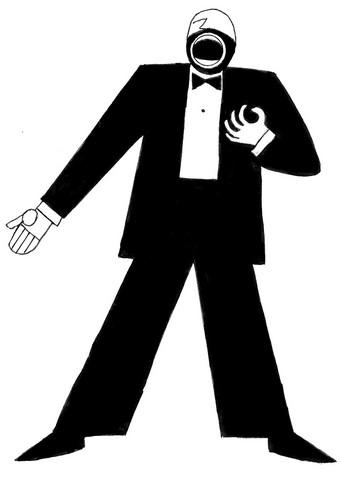Conductors are (largely) superfluous
Before I get fired from all of the very necessary (from a financial standpoint at least) concerts I have coming up in the next few months, allow me to elaborate on what I think is an important but complex issue.
I come from a very conductor-centric universe, having attended a fabulous music college which had choral singing and conducting at its core. In my undergraduate, I had many memorable and profound musical experiences which I would not trade for anything. One of my main regrets about my time there is that we never did anything without a conductor. Even small ensembles of four to ten still used a conductor, which to me seems slightly ridiculous. I understand it is important to help train conductors, but at the same time, singers could stand to grow from taking full responsibility for the success of the music. For young students it is important to learn fundamentals and to gain knowledge from an experienced conductor, but it is also important to help students to grow as individuals and develop a unique musical personality.
I have studied conducting off and on for awhile and have, at various points, considered devoting my life to the craft. I have a great respect for many conductors; for the insight, scholarship and experience they bring to music making. But how, if at all, is what they are doing up there in front of the choir having any impact on how I’m performing? This is one of the great mysteries of making music with a conductor. I can take purely technical things from a conductor's gesture, i.e. tempo changes, cutoffs but also less tangible things such as breath, phrasing and emotion. Still, if I feel I am getting nothing more from a conductor than a metronomic representation of the music, I am more inclined to tune out and stop watching. Watching the conductor is only one way of getting everyone in the ensemble together.
When I went overseas I entered a musical world that was, in many ways, the antithesis of my previous conductor-as-god experiences, finally singing in smaller ensembles without a conductor. If you are singing in a group with four other people, you can decide things democratically and, more importantly, use your ears to guide you. If each singer is really listening, minute adjustments can be made as the music unfolds. After some practice with this, you don’t need to spend valuable rehearsal time discussing quaver rests, vowels and tempo. Rehearsal time can be spent largely on interpretation and working with text, much in the way a singer would work with a coach. What a concept: using your ears and being responsive to body language can fix most problems right then and there! Breaths and cutoffs magically come into focus, tempo sorts itself out and tuning just locks into place.
These principles are easy enough to implement with five singers, but why shouldn't the same approach work for a group of 12, 24 or even 30? If everyone in the group is aware of what every other singer is doing, the conductor can assume the role of collaborator and function almost as another member of the ensemble rather than a dictator. Gesture can become more interpretive, flexible and spontaneous instead of purely metrical and repetitive. There is more give and take between the conductor and the singers, with almost a dialogue occuring between them. So why is this sometimes lacking? The problem lies in part with the singers: they are largely taught to be passive, awaiting instruction rather than taking initiative for the success or failure of the music. Instead of teaching singers to fear the wrath of a conductor, why not take a step back and let them do the work? Giving the singers the tools to listen and interact musically only makes the conductor’s job easier. I believe that with the right foundations in place a conductor of 100 would have to do no more than a conductor of 12 in order to get the desired effect.
This brings up another issue, conductor ego. To have a healthy conductor-singer relationship requires some giving up of control and trust from both parties. An egomaniacal conductor will never really make collaborative music with his or her ensemble. One of my biggest pet peeves as a singer is when a conductor implores singers to "just watch me". To me, this translates in effect as "this will not work unless you do what I say. I am the decider of how this will go". "Just watching" is only one little piece of the puzzle, an attempt at a fix-all solution which in the end falls short. Using my eyes and ears and being aware of what's going on around me ends up being more helpful than a conductor. A conductor can yell at a choir until her or she is blue in the face, but one simple word would quickly solve the problem: Listen.


0 Comments:
Post a Comment
<< Home